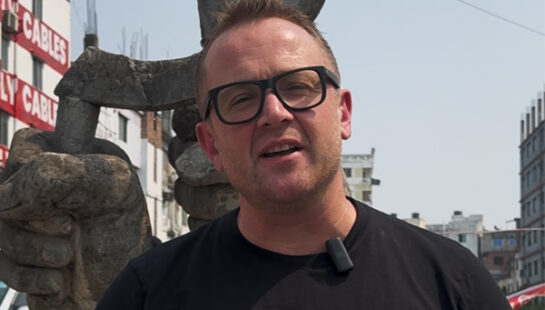- 2022 Report finds just 10 per cent of fashion brands pay a living wage at any factories in the final stage of the supply chain.
- Fashion companies average just 29 out of 100 on ethical supply chain benchmark.
- 40 per cent of companies don’t know who supplies their raw materials and have no project to trace them.
Australia, 18 October 2022: On Anti-Slavery Day, Baptist World Aid (BWA) has released its largest and most transparent Ethical Fashion Report, urgently calling on fashion brands to escalate action to address modern slavery, worker exploitation and unsustainable environmental practices throughout their supply chains.
The impacts of COVID-19, conflict, economic instability and widespread corporate greenwashing have driven Baptist World Aid (BWA) to increase the scope and transparency of its report in 2022 to shine a light on the significant industry-wide progress needed to respect workers and protect the environment.
The ninth edition of the report assessed 120 companies, representing 581 brands (161 more than 2021) and found an average score of just 29 out of 100. The report shone the spotlight on six key issues in the supply chain: tracing materials beyond final-stage, remediation of labour exploitation, payment of living wages, support for worker voice and empowerment, use of sustainable fibres and commitment to climate action.
Top Scoring Companies 2022:
- Mighty Good Basics
- Patagonia
- AS Colour
- Inditex
- Adidas
- Puma
- Hanes Brands
- Rodd & Gunn
- Nudie Jeans Co
- Kmart and Target Australia
Most Improved Companies 2022:
- Forever New (+20.76)
- R.M. Williams (+20.69)
- Nobody Denim (+13.83)
- Rip Curl (+13.76)
- Lorna Jane (+12.25)
- Universal Store (+10.76)
- Kmart and Target Australia (+9.48)
- Princess Polly (+8.04)
- Boohoo (+8.04)
- Ralph Lauren (+7.97)
Nowhere To Hide
Founded on robust research methodology that’s been refined over nearly a decade, the report now publishes scores out of 100, instead of the previous A+ to F grading system, resulting in a more transparent assessment of each brand’s progress and performance.
While the overall results paint a bleak picture, encouragingly brands that have participated in the report for multiple years are showing positive change towards more ethical practices. The average score for brands included for the last two years increased from 32.5 in 2021 to 34.85 in 2022. In contrast, companies included in the report for the first time this year performed significantly worse with an average score of just 9.7.
Sarah Knop, Corporate Advocacy Lead at Baptist World Aid (BWA) said, ‘Cost of living is a concern for many Australians in 2022, but for most of the world’s garment workers, earning a living wage is a lifelong struggle. Only one in ten fashion companies assessed pay a living wage in the final stage of production—even less in the earlier stages of the supply chain.
‘While it’s positive to see progress among some brands committed to improving their ethical supply chains in the last year, overall, this year’s Ethical Fashion Report is sobering reading for shoppers, investors and leaders in the fashion industry. It’s time for brands to prioritise action over rhetoric, to move from policies and commitments to tangible outcomes that support vulnerable workers and our vulnerable planet.’
Footwear Brands A Step Behind
New to the report in 2022, footwear brands performed well below industry average (23/100), including:
- None of the footwear companies pay a living wage at any stage of their supply chain.
- No footwear companies have traced all inputs (materials) suppliers in contrast to 11.4 per cent of clothing brands.
- 56 per cent of footwear companies couldn’t provide names and addresses for any of their raw materials suppliers, compared to 37% of clothing companies.
- Only eight per cent of footwear brands had a process at final-stage factories to respond to child and forced labour human rights violations when uncovered.
Labour Exploitation Still Rife
The report found the fashion industry has a long road ahead to eliminate labour exploitation from supply chains with only one in seven companies able to demonstrate a corrective action plan.
‘With over 60 million garment workers worldwide, it’s time to move beyond policies to take tangible action to empower workers at every stage of the supply chain. Stories of garment workers like Layla in our guide, who’ve worked 13-hour days from age 14, experienced workplace abuse, to earn just $85 a month, is far too common,’ said Sarah Knop.
A Gap In The Uptake Of Sustainable Practices
Fashion is also one of the most environmentally damaging industries for the planet, underlining the need for fashion companies to invest in sustainable fibres. For more than half of companies (54.2 per cent), sustainable fibres represent just 25 per cent or less of their production, and this could be as low as one per cent which is little more than a token amount. The lack of data and investment in research into the environmental impacts of fibres means that any efforts to transition to more sustainable fibres are likely uninformed and ineffective. Yet any increase in sustainable fibres use is countered by an upward trend in the production of faster, cheaper plastic-based fibres made from virgin materials.
When it comes to climate action, only 15 per cent of companies assessed evidenced sufficient commitment and action for emissions reductions in line with the United Nations Fashion Industry Charter for Climate Action. Australian companies are lagging behind their international counterparts on this issue, with just one of these top 18 scorers based in Australia.
What Can Global Citizens Do?
This year, Baptist World Aid is not only calling on the fashion industry to improve, but also encouraging global citizens to use their power to influence change. Over the last nine years they have seen a significant shift in consumer trends, with Aussies now buying twice as many items as they were 15 years ago.
So, while companies maintain primary responsibility for supply chain conditions, global citizens can also help shift industry practice by engaging with the ethical fashion movement and speaking out to companies.
Baptist World Aid are urging people to use this year’s report and the online Brand Finder as a tool to empower more ethical decisions.



 Sophia Russell,
Sophia Russell,

 Mike Bartlett
Mike Bartlett